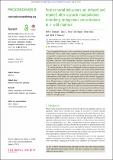Files in this item
Positive social behaviours are induced and retained after oxytocin manipulations mimicking endogenous concentrations in a wild mammal
Item metadata
| dc.contributor.author | Robinson, Kelly Joanne | |
| dc.contributor.author | Twiss, Sean D. | |
| dc.contributor.author | Hazon, Neil | |
| dc.contributor.author | Moss, Simon | |
| dc.contributor.author | Pomeroy, Patrick | |
| dc.date.accessioned | 2017-05-24T12:30:08Z | |
| dc.date.available | 2017-05-24T12:30:08Z | |
| dc.date.issued | 2017-05-31 | |
| dc.identifier | 249837423 | |
| dc.identifier | a0ad368a-d72b-4cfe-8bdc-1df104f1e732 | |
| dc.identifier | 85019758729 | |
| dc.identifier | 000405148800003 | |
| dc.identifier.citation | Robinson , K J , Twiss , S D , Hazon , N , Moss , S & Pomeroy , P 2017 , ' Positive social behaviours are induced and retained after oxytocin manipulations mimicking endogenous concentrations in a wild mammal ' , Proceedings of the Royal Society B: Biological Sciences , vol. 284 , no. 1855 , 20170554 . https://doi.org/10.1098/rspb.2017.0554 | en |
| dc.identifier.issn | 0962-8452 | |
| dc.identifier.other | ORCID: /0000-0003-1603-5630/work/46569085 | |
| dc.identifier.other | ORCID: /0000-0002-6212-9710/work/75996846 | |
| dc.identifier.uri | https://hdl.handle.net/10023/10837 | |
| dc.description | This work was conducted as part of a PhD, funded by the Natural Environment Research Council (NERC), UK (grant number NE/H524930/1) and by SMRU Marine, St Andrews, UK. PPP and SDT were in receipt of NERC grant NE/G008930/1 during the work. | en |
| dc.description.abstract | The neuropeptide hormone oxytocin modulates numerous social and parental behaviours across a wide range of species, including humans. We conducted manipulation experiments on wild grey seals (Halichoerus grypus) to determine whether oxytocin increases proximity-seeking behaviour, which has previously been correlated with endogenous oxytocin concentrations in wild seal populations. Pairs of seals that had never met previously were given intravenous injections of 0.41 µg kg−1 oxytocin or saline and were observed for 1 h post-manipulation. The dose was designed to mimic endogenous oxytocin concentrations during the observation period, and is one of the lowest doses used to manipulate behaviour to date. Seals given oxytocin spent significantly more time in close proximity to each other, confirming that oxytocin causes conspecifics to seek others out and remain close to one another. Aggressive and investigative behaviours also significantly fell after oxytocin manipulations. Despite using a minimal oxytocin dose, pro-social behavioural changes unexpectedly persisted for 2 days despite rapid dose clearance from circulation post-injection. This study verifies that oxytocin promotes individuals staying together, demonstrating how the hormone can form positive feedback loops of oxytocin release following conspecific stimuli, increased motivation to remain in close proximity and additional oxytocin release from stimuli received while in close proximity. | |
| dc.format.extent | 8 | |
| dc.format.extent | 545178 | |
| dc.language.iso | eng | |
| dc.relation.ispartof | Proceedings of the Royal Society B: Biological Sciences | en |
| dc.subject | Oxytocin | en |
| dc.subject | Manipulation | en |
| dc.subject | Social behaviour | en |
| dc.subject | Proximity seeking behaviour | en |
| dc.subject | Seal | en |
| dc.subject | Intravenous | en |
| dc.subject | QH301 Biology | en |
| dc.subject | QL Zoology | en |
| dc.subject | DAS | en |
| dc.subject | NERC | en |
| dc.subject | BDC | en |
| dc.subject.lcc | QH301 | en |
| dc.subject.lcc | QL | en |
| dc.title | Positive social behaviours are induced and retained after oxytocin manipulations mimicking endogenous concentrations in a wild mammal | en |
| dc.type | Journal article | en |
| dc.contributor.sponsor | NERC | en |
| dc.contributor.institution | University of St Andrews. School of Biology | en |
| dc.contributor.institution | University of St Andrews. Sea Mammal Research Unit | en |
| dc.contributor.institution | University of St Andrews. Marine Alliance for Science & Technology Scotland | en |
| dc.contributor.institution | University of St Andrews. Scottish Oceans Institute | en |
| dc.contributor.institution | University of St Andrews. Centre for Research into Ecological & Environmental Modelling | en |
| dc.identifier.doi | 10.1098/rspb.2017.0554 | |
| dc.description.status | Peer reviewed | en |
| dc.identifier.grantnumber | NE/G008930/1 | en |
This item appears in the following Collection(s)
Items in the St Andrews Research Repository are protected by copyright, with all rights reserved, unless otherwise indicated.

